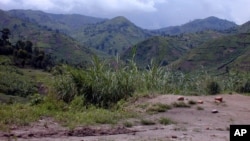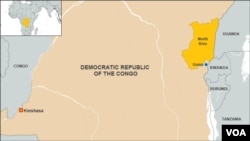GOMA —
Farmers organizations have been meeting in the eastern Democratic Republic of Congo to discuss changes to the country’s land law, which is being revised. Experts say the current law, mainly dating from colonial times, is out of date and failing to prevent conflict. The land problems are acute in the country's North Kivu province.
On a roadside in Masisi territory all around are green hills, lush pastures for herds of cattle.
The cattle are contentedly grazing on this unfenced, seemingly boundless grassland. But some of the neighbors are not so happy with this state of affairs - like this smallholder farmer who asked for his name to be withheld.
He says the number of cattle in the area has increased because large farmers have bought up the surrounding hills for pasture. He went on to say that it’s difficult for local people to find anywhere to grow their crops.
Traveling around this area one notices an odd feature of the landscape. The plains and valleys, and where the hills rise to a plateau, all areas suitable for growing crops, have been taken for pasture.
Most of the cultivated areas are on steep slopes. And those slopes are eroding fast. Farming advisers say that after a few agricultural seasons they should be left fallow for 10 years, but they aren’t.
This territory of Masisi is where land conflict first turned into ethnic war in North and South Kivu provinces. Nearly 20 years ago fighting broke out between the agriculturalists and the ranchers, and many of the cattle were killed. But since then the ranchers have expanded their territory.
Farmers’ organizations met at a forum in the North Kivu provincial capital Goma this month, to discuss land shortage and land law.
The speaker lists the land problems in Masisi. A major problem, he says, is the competition between agriculturalists and ranchers, and one sign of that are the herders, or cowboys, carrying guns.
One of the small farmer representatives from Masisi was Augustin Munyanziza.
He says that there’s now a war in North Kivu caused by the M23 rebels and armed groups like the Raia Mutomboki, but the real cause is the land problem. He says in Masisi, 70 percent of the land has already been sold as large concessions, with the result that the population lacks arable land.
And it's an ethnic war, he says, because there’s an ethnic dimension to land use.
Some ethnic groups till the soil while others raise cattle, says Munyanziza, and there’s conflict between the two groups which are mainly Hunde, Hutu, Tembo and other tribes on the one hand and Tutsi on the other.
Land conflict expert Oumar Syllah, who works for United Nations agency U.N. Habitat, says it’s too simplistic to suggest the land problems come from one community taking over too much land.
"We need to be careful and not jump to rapid conclusions. But we know there are a lot of Tutsi dignitaries who take control of land based on their financial power or their political power, and this a reality," said Syllah.
An outdated legal code, Syllah says, has been part of the problem. He says it fails to protect security of tenure and investment and is largely irrelevant to small or peasant farmers.
Peasant famers’ rights to their land are based on custom, meaning recognition by their traditional chiefs. They often have no written documents granting them land rights, and if they do, the documents were usually granted by the chief, and are not recognized by the law. This can be quite convenient for the chief if he wants to sell the land to someone else.
The land law, which was last updated in 1973, says customary rights to land will be defined by a presidential decree, but that decree has never been issued.
Oumar Syllah is advising the government on changes to the land law.
"We need to think about how we can have a kind of democratic system for access to land. Right now we have military involvement and influential people involved, which is not in favor of local communities," he said.
The organizers of the three-day forum in Goma earlier this month have yet to circulate a clear statement of what was agreed as farmers’ recommendations for land law reform. In a newspaper article they said it was agreed that the new law should recognize documents given to farmers by traditional chiefs.
A farmers’ representative at the forum, Safari Gasimba, said that that recommendation should go further.
He said if they are going to lobby for legal recognition for documents issued by chiefs, they should at the same time lobby for democratization at the local level, as laid down in the constitution, so that chiefs will be advised by representatives elected by the local community.
The chiefs’ authority is increasingly being challenged in North Kivu, and especially in Masisi, where population movements have meant that many inhabitants no longer recognize the traditional chiefs as their clan leaders.
On a roadside in Masisi territory all around are green hills, lush pastures for herds of cattle.
The cattle are contentedly grazing on this unfenced, seemingly boundless grassland. But some of the neighbors are not so happy with this state of affairs - like this smallholder farmer who asked for his name to be withheld.
He says the number of cattle in the area has increased because large farmers have bought up the surrounding hills for pasture. He went on to say that it’s difficult for local people to find anywhere to grow their crops.
Traveling around this area one notices an odd feature of the landscape. The plains and valleys, and where the hills rise to a plateau, all areas suitable for growing crops, have been taken for pasture.
Most of the cultivated areas are on steep slopes. And those slopes are eroding fast. Farming advisers say that after a few agricultural seasons they should be left fallow for 10 years, but they aren’t.
This territory of Masisi is where land conflict first turned into ethnic war in North and South Kivu provinces. Nearly 20 years ago fighting broke out between the agriculturalists and the ranchers, and many of the cattle were killed. But since then the ranchers have expanded their territory.
Farmers’ organizations met at a forum in the North Kivu provincial capital Goma this month, to discuss land shortage and land law.
The speaker lists the land problems in Masisi. A major problem, he says, is the competition between agriculturalists and ranchers, and one sign of that are the herders, or cowboys, carrying guns.
One of the small farmer representatives from Masisi was Augustin Munyanziza.
He says that there’s now a war in North Kivu caused by the M23 rebels and armed groups like the Raia Mutomboki, but the real cause is the land problem. He says in Masisi, 70 percent of the land has already been sold as large concessions, with the result that the population lacks arable land.
And it's an ethnic war, he says, because there’s an ethnic dimension to land use.
Some ethnic groups till the soil while others raise cattle, says Munyanziza, and there’s conflict between the two groups which are mainly Hunde, Hutu, Tembo and other tribes on the one hand and Tutsi on the other.
Land conflict expert Oumar Syllah, who works for United Nations agency U.N. Habitat, says it’s too simplistic to suggest the land problems come from one community taking over too much land.
"We need to be careful and not jump to rapid conclusions. But we know there are a lot of Tutsi dignitaries who take control of land based on their financial power or their political power, and this a reality," said Syllah.
An outdated legal code, Syllah says, has been part of the problem. He says it fails to protect security of tenure and investment and is largely irrelevant to small or peasant farmers.
Peasant famers’ rights to their land are based on custom, meaning recognition by their traditional chiefs. They often have no written documents granting them land rights, and if they do, the documents were usually granted by the chief, and are not recognized by the law. This can be quite convenient for the chief if he wants to sell the land to someone else.
The land law, which was last updated in 1973, says customary rights to land will be defined by a presidential decree, but that decree has never been issued.
Oumar Syllah is advising the government on changes to the land law.
"We need to think about how we can have a kind of democratic system for access to land. Right now we have military involvement and influential people involved, which is not in favor of local communities," he said.
The organizers of the three-day forum in Goma earlier this month have yet to circulate a clear statement of what was agreed as farmers’ recommendations for land law reform. In a newspaper article they said it was agreed that the new law should recognize documents given to farmers by traditional chiefs.
A farmers’ representative at the forum, Safari Gasimba, said that that recommendation should go further.
He said if they are going to lobby for legal recognition for documents issued by chiefs, they should at the same time lobby for democratization at the local level, as laid down in the constitution, so that chiefs will be advised by representatives elected by the local community.
The chiefs’ authority is increasingly being challenged in North Kivu, and especially in Masisi, where population movements have meant that many inhabitants no longer recognize the traditional chiefs as their clan leaders.












